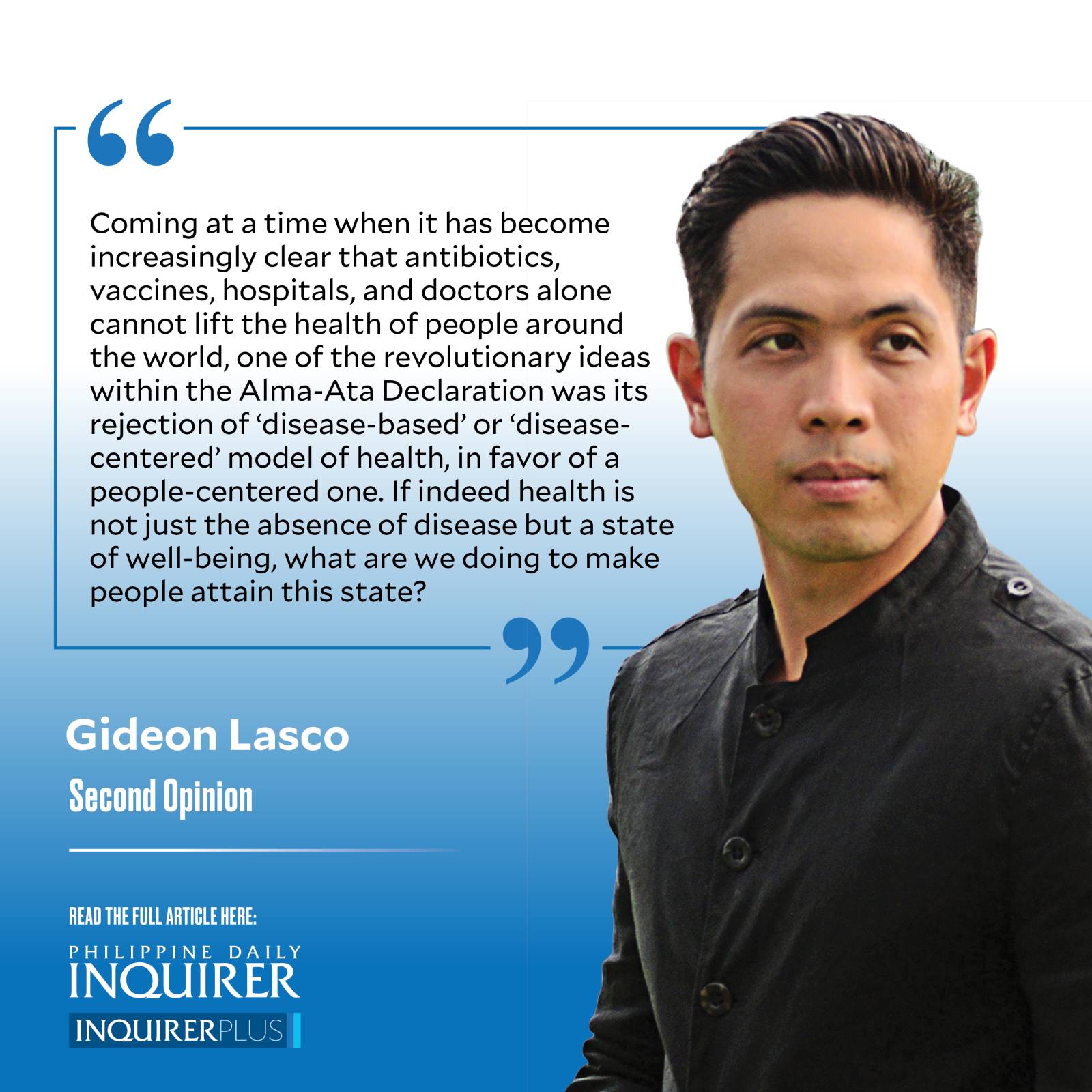Beyond a disease-based model of health
Almaty, Kazakhstan—Here in Almaty—the sprawling, mountain-surrounded Central Asian city once known as Alma Ata—an important document was signed in September 1978 by member states of the World Health Organization. Simply known as the Alma-Ata Declaration, the document defined health as “a state of complete physical, mental, and social well-being, and not merely the absence of disease and infirmity”—and reaffirmed it as “a fundamental human right” that governments have the responsibility to provide to their people.
Crucially, it called for a primary health care approach to health, which entails “providing promotive, preventive, curative, and rehabilitative services,” ensuring community participation, and including basic aspects of health care like family planning, immunization, safe water, maternal and child care, and provision of essential drugs.
Article continues after this advertisementComing at a time when it has become increasingly clear that antibiotics, vaccines, hospitals, and doctors alone cannot lift the health of people around the world, one of the revolutionary ideas within the Alma-Ata Declaration was its rejection of “disease-based” or “disease-centered” model of health, in favor of a people-centered one. If indeed health is not just the absence of disease but a state of well-being, what are we doing to make people attain this state?
This cannot be more relevant for our time, when many health interventions and programs continue to be laser-focused responses to particular illnesses, sometimes at the expense of overall well-being—and often disregarding the social and political determinants of health.
Consider COVID-19, and how many of the policies have focused on reducing the number of cases and deaths—whether effectively or not. Plastic barriers, for instance, were considered only for its value to prevent COVID (even then, a dubious claim) without regard for their impact on environmental health, as well as their detrimental effect in making people go outdoors (in the case of face shields), or in putting people at risk for accidents (in the case of those motorcycle barriers).
Article continues after this advertisementThe ban on outdoor spaces, too—including what little public green spaces and parks we have—was considered only based on the idea that doing so can prevent COVID (once again, a groundless policy given the relative safety of the outdoors), without regard for the all-important role of the outdoors in improving physical and mental health.
And what of the developmental, physical, and social toll on our children and young people of our protracted education lockdown?
I say the above without underestimating the toll of COVID-19. Especially in the first weeks and months of a then-unknown disease, it was understandable to take extreme measures. We must recognize, however, that lifestyle diseases—ischemic heart diseases and cerebrovascular disease—caused more deaths in the country than COVID-19 even at the latter’s peak in 2021; which is why it is just as important to avoid what we then called the “covidization of health care.” And, of course, beyond the important goal of addressing disease, we need to prevent them and improve people’s quality of life—which is why parks, bike lanes, walkable streets, nutrition programs, public health information campaigns, accessible health care centers are just as important as hospitals.
Aside from public health policy, the disease-based model also affects medical practice, with doctors and patients alike often preoccupied with addressing a particular pathology, often forgetting what it is that patients actually worry about, and the other aspects of their health. Ideally—and as advocated for in the specialty of family medicine—a “primary physician” will look at people more holistically, only referring them when necessary. But our health care system remains specialty-based and—notwithstanding efforts from our educators—so is our medical curriculum.
Fortunately, the Alma-Ata Declaration, and the movement behind it, have also placed us in a better position to realize its goal of people-centered health care. The declaration’s endorsement of community health workers, for instance, has helped give rise to our barangay health workers, whose service has been immense and whose potential for health service delivery remains untapped.
Moreover, the declaration’s guiding principles have found its way in our national policies, including the Universal Health Care Act (Republic Act No. 11223) that affirms health as a right and endorses a “people-oriented,” as well as a “whole-of-government, whole-of-society” approach.
Then as now, however, we have not fully acted on these ideas; public health remains politically and financially underprioritized—and health, as defined in Alma Ata, remains a privilege for the few who can afford it.
—————-
glasco@inquirer.com.ph
For more news about the novel coronavirus click here.
What you need to know about Coronavirus.
For more information on COVID-19, call the DOH Hotline: (02) 86517800 local 1149/1150.
The Inquirer Foundation supports our healthcare frontliners and is still accepting cash donations to be deposited at Banco de Oro (BDO) current account #007960018860 or donate through PayMaya using this link.

















